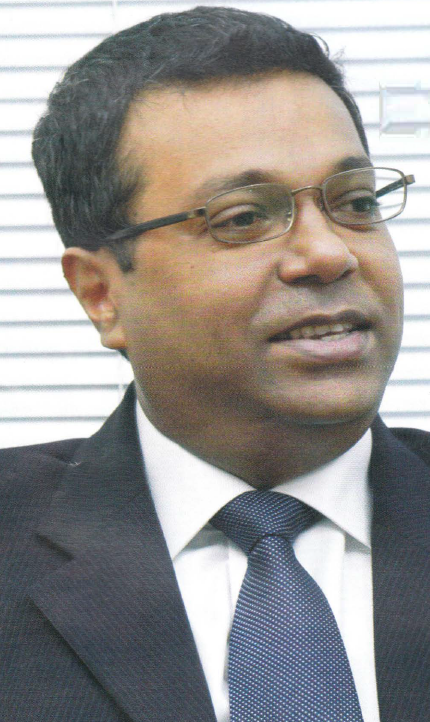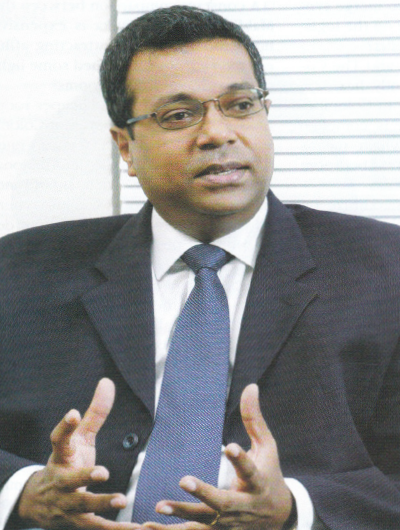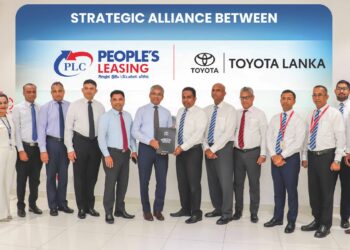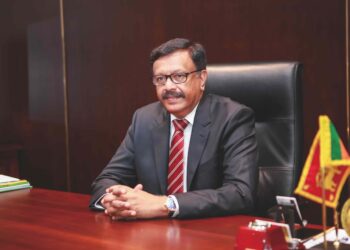Rohan Karr took over the position of General Manager of The Colombo Plaza hotel in November 2003 and he was recently appointed as the Executive Di rector of the Trans Asia Hotel. He speaks to Business Today about both hotels which are owned by John Keells Holdings (JKH), issues pertaining to the hospitality sector, and his successful career. His story is an inspiration to many, display ing perseverance and a v1s1on that is certain to take these two five-star properties to new heights as well.
By Rashmini Mather Assisted by Anisha Niyas

Can you begin by giving us a brief overview of your career and how you entered the hospitality sector?
My career in hospitality spans 24 years. However when I entered the field in 1980, it wasn’t my original choice of career. I began working as a night trainee at a Holiday lnn in London in order to pay for my accountancy school fees. As I gained more experience, I was consequently promoted. I then made the decision to focus on this field and worked my way up; from a trainee position, I became a steward and later was promoted to senior positions. It took me 14 years to become a hotel general manager in the UK. I was appointed as General Manager of the Bristol Marriott Hotel when I was 36. My desire was to be the youngest GM in the Marriott group and, eventually, a GM of a central London hotel. The youngest person who received the post was 35 so I missed it by one year but. in 2001, I achieved my second goal and was made General Manager at the Marriot in Marble Arch in central London. During my time in the UK I completed my degree in Hospitality Management followed by a Masters in Business Administration. I was also a visiting lecturer at the Thames Valley University on Revenue Management.
What made you decide to return to Sri Lanka?
Predominantly for family reasons. I wanted my two children to experience a true sense of Sri Lankan culture and I had also wanted to work here. I chose to migrate from Sri Lanka because of the unstable situation that prevailed at that time. But I had been contemplating coming back home for some time. I believe my job with John Keells was meant to be. I was holidaying in Sri Lanka with my wife and staying at The Colombo Plaza as a guest the week JKH bought this hotel. I was in Colombo looking at the possibilities of settling down and wanting to get a feel of the place. I recall sitting in the lobby and telling my wife that I wished I could get my hands on this property. A week later I left for the UK with a contract to take over as the new General Manager of The Colombo Plaza. God had ensured that I was at the right place at the right time.
Over the past year, The Colombo Plaza appears to have discovered a new lease on life, so to speak, with a series of new exclusive restaurants and bars as wt:11 as a greater presence in the market. What other plans are to be anticipated? The property had great potential but was under-utilized. It needed a change. With the staff’s commitment and with JKH’s investment and support, the realization of my vision and goals were made possible. Every new venture we have embarked upon so far has been successful and well received by the local market. A refurbishment program of nearly US$20 million is currently underwa,·. 250 rooms in the main -ing of the hotel will be completely refurbished which will increase the total number of rooms to 501. On completion of the refurbishment, we will have some of the best rooms and suites in Colombo. The hotel’s ballroom is also pan of the current refurbishment program. The newly renovated ballroom will be ready for operations by mid-March. The expanded ballroom will be the biggest multifunctional hotel venue in Colombo with the flexibility of catering to a variety of events. The atrium, which is the old Oberoi lobby, will also be convened into another multi-functional room and will be ready i’n September. Therefore, The Colombo Plaza will be the only hotel in Colombo to have two ballrooms. June will see the opening of the Banyan Tree’s Angsana Spa & Health Club to be operated by the Angsana Spa Group. This new concept will offer state-of-the-art health club gymnasium, complemented by a pa encompassing the best of facilities. The complex will also house an Italian restaurant, a Spa cuisine outlet and a rooftop swimming pool. The hotel also envisages the opening of two more restaurants in December – an Indian restaurant and a noodle bar. Both restaurants will offer something different to the market.
You have been appointed to the Trans Asia Hotel board us the Executive Director. The Colombo Plaza and Trans Asia Hotel are set to merge synergies. Can you elaborate on the logistics and the obvious benefits?
With both Trans Asia and The Colombo Plaza, JKH currently has 32% of the bedroom capacity in Colombo. Once the refurbishment is complete we will control 45%, which means that nearly half of Colombo’s bedroom capacity belongs to JKH. Our objective is to maximize on all opportunities available through a ·faster”, “better’·, ·’cheaper” approach which will benefit all our stakeholders i.e. shareholders, customers and associates. This means our service has to be expedited, product enhanced and cost minimized. Therefore, we are constantly seeking opportunities to improve and expand our business in keeping with evolving market trends. Whether it’s sales, marketing, training. purchasing, administration, financing or human resources, we have to merge the synergies to better the business. We are looking at every available opportunity to better today, be it selling our products and services to the Customer or buying products and sen-ices from a supplier. Our emphasis will be to ensure return on capital to our shareholders and making our associates feel they are part of the JKH family·. These are fundamental element of taking the best of both hotels and sharing best practices. Trans Asia might have implemented a very effective practice. which we at The Colombo Plaza can learn from and vice versa. We are not competing with one another; we are supporting and complementing each other to ensure we become market leaders.
Are there similar plans of expansion and/or refurbishment for Trans Asia Hotel?
We are constantly looking at opportunities to improve our product. Currently Trans Asia is undergoing a million bedroom refurbishment. The difference is that the The Colombo Plaza is 30-year-old hotel and little had been done so far, It requires more investment and refurbishment is completed, we will have the two best five-star hotels in Colombo.
A constant comparison between the Maldives and Sri Lanka is expensive hotel room rates and attracting affluent travelers. Can you shed some light on the pricing of hotel rooms?
If we could deliver cheaper room rates we would, but at present Colombo is already sold at very cheap rates when compared to the international markets. However, what should not happen is a monopoly scenario where all the hotels raise prices without delivering to the customer what they expect and want. We believe that if we can deliver a better product, excellent service and exceed customer expectations at all levels, then there are enough reasons to charge a premium. As soon as you make an investment and get your product right, have the right people, serve the right customer at the right time, then you can charge the right prices.
Under the JKH strategy, The Colombo Plaza is to be positioned as a premier business conventions venue and Trans Asia Hotel as a city resort hotel. Can you explain the rationale of this plan?
The obvious rationale is that we do not warn the hotels to compete against each other, but to synergize our efforts and resources to increase our market fair share. Having two ballrooms, 500 bedrooms and strategic location, it makes sense for The Colombo Plaza to be made a business conventions hotel while Trans Asia’s scenic location, style and ambience makes it an ideal place as a city resort hotel catering to the leisure segment. It also creates opportunities when selling the hotel in Sri Lanka or overseas as we can offer our product to a variety of customers. whether it is business. conventions. leisure or incentives.
How many employees are there at The Colombo Plaza?
At present we have about 850 employees to carer to the current room numbers. By December, there will he an increase in staff to cater to the newly refurbished 250 rooms.
“I strongly believe that your destiny is in your hand. Life is not what it is; it is what you make of it. You can sit back and feel sorry for yourself or you can say I’m going to do something about my life. You have to grab every opportunity that comes your way, take your life and run with it, exceed expectations and give it your best.”
The hospitality industry is people oriented and thus personnel development is a crucial element. How do you motivate your staff to perform their best?
Our staff is one of our three stakeholders. One of the fundamental values of our business is that we should “treat others the way we would like to be treated”. Sometimes there is a tendency for us to treat the customers better and our associates different. The main rationale for this is that if you take care of your associates, the associates will take care of your customers. If your staff is happy, they will keep your customers happy and in return the business will profit. Every staff member is not merely a number but a part of a larger family. When they are valued, appreciated and recognized, they are motivated to give of their best. More than formal training, maintaining a constant rapport with your staff is crucial to a successful business. I make it a point to walk around the property daily. This gives me an opportunity to interact with the staff Nobody wants to be second best; but sometimes we settle for second best, which is wrong. If you give them the necessary tools, training and support they need. they will deliver the best.
What lessons do you draw upon from your experience in the UK?
The main lesson I learned in the UK, working for an international chain like the Marriott, is if you don’t give your 200%, you cannot survive. You need to be 200% committed and everything needs to be done in a quality oriented way. The Marriott chain gives you all the necessary experience, techniques, training and support. An international brand gives you a great foundation and you can learn a lot about their philosophies, what needs to be achieved and what international travelers require. These lessons have obviously helped me in my position here. The hospitality business is nothing complicated; we are in a people business, making people happy.
The Colombo Plaza does not have the similar support system unlike a renowned international brand such as the Marriott, particularly in terms of training. So what programs have been implemented in this respect?
It is certainly a challenge not being a part of an international brand and nor having the brand support in terms of training, standards and marketing. It makes life a little more difficult bur if you have the will and the experience, anything is possible. \Ve are currently in the process of identifying and rolling out training plans for both hotels, department by department, month by month. We analyze aspects such as what we learned the previous month, what elements we need to improve on, finding out what we are good at, and whether an investment injection in this area will mean we can do even better. We have some external trainers who conduct seminars on positive thinking and thinking out-of-the-box; this kind of customer care and conceptual training is vital. However, the basics have to come from within. Each department has its own trainers whom we have identified and they have been through various train-the-trainer programs.
Inferior service is a common complaint in Sri Lanka. What is being done in your hotel to uplift the levels of service and how do you think it can be improved in the country as a whole?
Firstly, I do not believe that Sri Lanka has poor service, particularly in comparison to other parts of the world. In fact, I think it is very good, but there is room for improvement. We have enough people to give service and deliver it in a friendly, smiling manner. The only aspect that hinders quality service is the lack of product knowledge or the language barrier. It is not the lack of willingness, courtesy or friendliness that prevents Sri Lankans from offering good service. If you can work on the two aspects of product knowledge and language, it will give them the confidence to further improve service. We haYe to change the notion people have that good service means being ‘the obedient servant’. Service can be relaxed and a happy experience for both parties – you don’t have to be afraid of your customer. You have to know your product. know what you are selling, whom you are selling co and make the buying and selling process a happy and enjoyable one. Sometimes the service is sub-standard due co the lack of training and tools. Therefore it is viral that we listen to our associates as well as the customers to understand their requirements. Sometimes customers complain of bad service because what we are trying to give them is not what they want. So if you can strike the right balance: giving and receiving service can be an enjoyable one.
The government recently initiated a massive tourism promotion campaign – ‘Bounce Back Sri Lanka·. But proper infrastructure, efficient travel media and a variety of entertainment are just as important for a holiday experience. In your opinion, what can be done to help the tourism industry?
The tourism industry and the marketing of Sri Lanka’s tourism are going through a positive change at the moment. We’re moving away from the “sun, sea sand” concept to promoting our nature, culture, history and people. Unfortunately the tsunami devastation last December had a grave impact on the tourism industry and thus plans have been somewhat disrupted. However, we have to be careful char we do not panic and begin selling our product cheap in order to buy tourism. People haven’t stopped coming here because we are expensive or because of poor service. They have temporarily stopped visiting because a tragic disaster has taken place, and they may not want to come here as an insensitive tourist at the present moment. Tourism will return to normalcy; we haven’t done anything negative to harm tourism; it’s not the country or the people, it’s nature. Yet this is a time for us to take stock of what we offered and what we want to offer, and plan for the future. We should chink carefully about getting the service and the infrastructure right – the transport options, highways. If the tsunami did not occur, we would have continued on the same trend instead of reviewing our progress and problems. We should to take this opportunity to make things better; we cannot revert to what we had before the tsunami. This is a time to rebuild, not a time for us to panic. We need to rebuild on our service levels, our product, our marketing strategy, and understand “·hat we want from our tourism sector for the next 20 years.
You worked yourself up from being a steward to the GM of a five-star hotel. What advice would you give to youngsters who are entering the hospitality sector?
My story can motivate a lot of people. As a child, I remember walking past the then Intercontinental and Oberoi Hotels in Colombo and wishing I would be taken in to see the place and have a meal. I’m not ashamed to say that I started my career a-; a steward and have worked in every department of a hotel. When I went to London. I wasn’t sure about what I wanted to do but I was determined. It was a tough schedule: I worked in the hotel at night, returning home at seven in the morning; then I would leave for school at ten in the morning. returning home at six in the evening, and then going to work again at ten at night. Working under these circumstances was nor easy, but I told myself, I’m not doing this for nothing: I’m giving of my best so I must get the best back from here too. I had that kind of vision and a definite dream of becoming a GM of a central London hotel. Until I achieved my goals I was nor going to give up. I always learned a lot from my peers. I maintained my own identity and had my own desires. dreams and vision. of what I wanted to achieve bur I observed the best qualities of my manager and superiors who have helped me to be what I want to be. I strongly believe that your destiny is in your hand. Life is not what it is, it is what you make of it. You can sit back and feel sorry for yourself or you can ay rm going to do something about my life. Nobody is going to put anything on your place; you have to help yourself. You have to grab every opportunity that comes your way, take your life and run with it, exceed expectations and give it your best. Sometimes being ‘best’ is defined by what another person has has. But the ‘best’ for you should be about what you want.
With long hours, overseeing different departments and plenty of PR, the work of a hotel GM is far from easy. What do you consider as vital traits for a GM?
You should be able to prioritize and delegate because you cannot do everything yourself, and you need a great team to work with you. The commitment, the excitement, and the smiling faces of happy staff and customers give me the motivation and energy. Yet this industry is certainly not for the weak hearted. It can be difficult but you have to establish the right balance between your work and your personal life. Sometimes I go for days without seeing my children because they leave before I wake up and they are fast asleep when I return home. I look forward to weekends to spend some time with them.
You have made an indelible mark in Sri Lanka’s hospitality industry in a short span of time. What are your own ambitions, and your vision for these two hotels and the JKH Group as a whole?
My vision for these two hotels is co make them the best in the country. With the financial support of JKH, our excellent produce and our committed employees, we will make it the best. There are bigger and better plans in the pipeline for both city hotels and this sector. We’re always looking for opportunities to expand the brand and the business, and establish our identity.
Personally, I didn’t come here co be the second best general manager. I came back co the country because I want to be successful and to be the best. Each day my life has been a success.
What is success in your eyes?
Having absolutely no regrets. When I go to bed at night I should have no regrets about that clay. Whether it is my achievements, my interactions with people or my business, I attempt to minimize regrets. Therefore if I have no regrets, I consider life a success.






